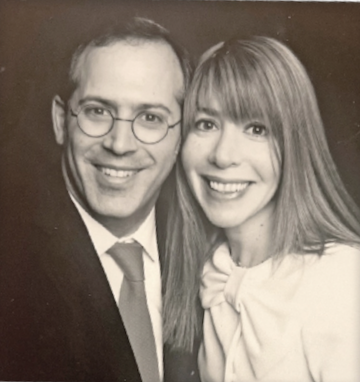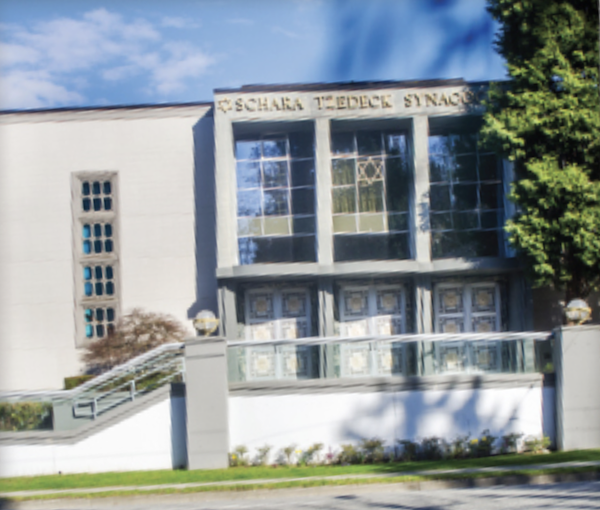Congregation Schara Tzedeck is celebrating 20 years since Rabbi Andrew Rosenblatt and Dr. Cirelle Rosenblatt arrived in Vancouver, and 115 years as the city’s flagship Orthodox congregation. (photo from Schara Tzedeck)
Members of Congregation Schara Tzedeck are celebrating 20 years since Rabbi Andrew Rosenblatt and Dr. Cirelle Rosenblatt arrived in Vancouver. And, while gala festivities are slated for June 14, the rabbi wants members of his congregation and the larger community to focus less on the individuals than on the role the synagogue has played in the past – and could play in the future.
Schara Tzedeck, which is marking 115 years as the city’s flagship Orthodox congregation, has been a central institution of the community, though Rosenblatt balks at the word “institution.”
“It’s more than a registered authority with CRA,” he said. “It is more than an organization with a letterhead. It’s even more than the sum of its membership because plenty of people who feel a connection with Schara Tzedeck may not currently be paying members but they may have a historical connection. They may live elsewhere now but feel very close to Schara Tzedeck.
“The thing that I want our community to appreciate and to value and perhaps give more attention to is that they are part of this very long story and, if they treat it well, it can play a very important role in their lives,” the rabbi said. “It can play a very significant role in their future and in the security of their family and the emotional health of their family.”
While Rabbi Rosenblatt has been tending to the spiritual and other needs of his congregants, Dr. Rosenblatt has been tending to the medical needs of individuals with brain injuries. As founder and director of Advance Concussion Clinic, she is a leader in the field of neuropsychology and has applied interdisciplinary expertise in concussion as a neuropsychologist and consultant to amateur and professional athletes and teams, including in the Olympics, the National Football League and the National Hockey League.
Reflecting back on two decades, Dr. Rosenblatt believes that it was no accident they landed in Vancouver.
“The primary feeling I have is one of gratitude,” Dr. Rosenblatt told the Independent. “I’m really grateful – I guess it’s appropriate for a rabbi’s wife – I’m really grateful that we were guided to Vancouver. I have a very strong sense of faith and belief that we were meant to be here and that there was a plan in place for us. [I’m] really grateful that God led us to this place but really also to the community and for the community and for the opportunities that Vancouver specifically provided for us and for our family.”
It is partly because of Dr. and Rabbi Rosenblatt’s scientific and theological intersections that the guest speaker for the gala, which is called Mosaic 2023, is Yeshiva University’s president, Rabbi Dr. Ari Berman.
“The reason that we thought it was such a good idea,” explained Rabbi Rosenblatt, “is that Yeshiva University’s motto is ‘Torah Ummada’ [‘Torah and Science,’ or secular knowledge]. The idea of sophisticated wisdom and intellectual disciplines coupled with Torah is going to be something that makes them both better on some level.”
Dr. Rosenblatt was educated in the Yeshiva University system from high school, through her undergraduate studies, to her doctoral work.
Rabbi Rosenblatt, a native of Baltimore, Md., received his smicha, rabbinic ordination, from Yeshiva University. He earlier completed an undergraduate degree in chemistry and English literature and a master’s in bioorganic chemistry at Columbia.

The gala will celebrate the two decades of the Rosenblatts’ service to the community but also the much longer history of Schara Tzedeck, which began as B’nai Yehuda, in 1907, and has been at the heart of Jewish Vancouver almost as long as there has been a Jewish Vancouver. But the rabbi worries that social changes are affecting his congregation and all religious assemblies, and community groups more broadly. Among these are declining engagement at religious services, the omnipresence of social media, the alienation from community connections and related phenomena that author Robert D. Putnam outlined in his 2000 book Bowling Alone: The Collapse and Revival of American Community.
“Those kinds of group spaces, those kinds of community living, are extremely powerful for the need of the individual in terms of their emotional health,” he said. “That, too, is under threat.”
For 115 years, under successive rabbis, Schara Tzedeck has been much more than the sum of its parts, said Rosenblatt.
“You have this network, this community, this thriving ability to provide help and resources and support in a rotating fashion,” he said. “The value of this community has lent emotional and financial and physical and every other kind of support you can possibly imagine. That’s severely threatened now in the 21st century.”
Being spiritual leader of Schara Tzedeck is to play a leadership role in maintaining the infrastructure of Jewish life in the city, including the mikvah (ritual bath) and the cemetery, as well as what is, in the context of those two community assets, a far more recent addition: the 32-kilometre eruv, the spiritual boundary that allows observant Jews to carry certain items outdoors on Shabbat, which Rabbi Avi Baumol created more than 20 years ago.
Taking wisdom that has been passed down for millennia and making it “speak in a modern voice” is what Rosenblatt calls his stock-in-trade, with the late chief rabbi of the United Kingdom, Rabbi Lord Jonathan Sachs, being a model he cites.
“We also try to do things that are a little bit on the creative side in terms of how people can access these mitzvot, but have very long-standing or deep roots in the Torah,” he said, citing a “sukkah-raising” that allowed people to get involved hands-on in the tradition.
“I guess that’s the Jewish equivalent of a barn-raising,” the rabbi said with a laugh. But the congregation also took the opportunity of the ancient tradition of constructing a temporary shelter to discuss the very modern reality of housing security.
Food security is another area that Rosenblatt has emphasized. For years, volunteers from the shul were involved in a vegetable garden at Yaffa House, Vancouver’s Jewish group home and centre for adults with mental illness. The rabbi would take bar mitzvah classes to the garden and talk about the importance of food and sustainability. He also takes great pride in the long presence of members of the Schara Tzedeck community as volunteers in groups like Yaffa House, Tikva Housing and other agencies.
Rosenblatt has trouble believing his family has been here for 20 years, but that passing of time has a very physical manifestation, in the form of the youngest of the Rosenblatts’ five children, the daughter the rabbi calls their “anchor baby,” who was born a few months after the family’s arrival.
“It’s hard for me to believe that her entire life is here,” he said, noting that all five (now adult) children love Vancouver. “They think it’s a really special place.”
As come-from-aways themselves, the Rosenblatts understand the long history of newcomers arriving, often from inhospitable places, to start a new life here. In the days of Schara Tzedeck’s Rabbi Nathan Pastinsky, who began his long service in 1918 and continued until his passing in 1948, the spiritual leader would meet migrants at the train and set them up with a cart from which to sell wares and begin a career.
“I’m not giving people carts anymore,” said Rosenblatt. But he is still very much involved in easing the way for newcomers to navigate the immigration system, find a job and housing and settle into the community.
Shelley Rivkin, vice-president of the Jewish Federation of Greater Vancouver, is just one person with accolades for the contributions the Rosenblatts have made to their chosen home.
“Rabbi Rosenblatt is a consummate bridge-builder,” Rivkin told the Independent. “He is always willing to reach out and have a conversation with anyone regardless of religious practice and beliefs. When you attend his Zoom classes, you see participants from across the Jewish community who are actively engaged in what he has to say.
“Cirelle (Dr. Rosenblatt) is a role model for modern Orthodox women,” Rivkin continued. “She is very learned. She is a highly respected professional and successful businesswoman and she is the mother of five children. When she gives a class, she is able to effectively weave together Torah study with contemporary issues.”
Rabbi Rosenblatt, though, deflects back to the longer history of the shul.
“I want people to understand that the anniversary of this milestone is a moment to appreciate how valuable this institution is,” he said.

